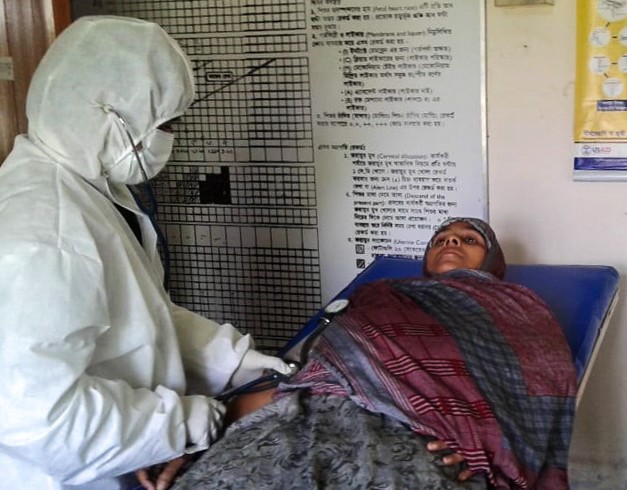Speeches Shim

Standing their ground against the COVID-19 pandemic, Bangladesh’s midwives and other health workers are going the extra mile to care for people and protect and save lives.
One young champion is 24-year-old Shilpi Rani Bormon. She has been working as a midwife in the remote Char Chandia Union Health and Family Welfare Center in Feni District’s Sonagazi upazila since 2019. Every day, she risks becoming infected and continues to provide health services. At times she feels disorganized and helpless, but she pushes on. Most people in her community are not well-educated and depend on this center for essential medical care.
Shilpi has never experienced a pandemic before so she has less confidence in being able to save lives during COVID-19. She does it anyway. “Being a part of this noble profession, I cannot keep myself away from these people who now need me more than ever,” she said. “We are going through a crisis, but we are frontline health workers. If we don’t give our best now, then what is the point of choosing this profession?”
The Char Chandia Union Health and Family Welfare Center operates in an area where USAID’s Maternal and Newborn Care Strengthening Project’s (MaMoni MNCSP) is active. The project has been working closely with the Bangladesh government in providing technical support to ensure quality maternal and newborn healthcare services since 2018. Training service providers to ensure that mothers and children get quality health services is an important part of this project. Even during the pandemic, the project has motivated service providers to continue essential, ongoing services adhering to national guidelines so that all mothers and newborns can access these much-needed services. The project team shares information on how to avoid being exposed to the virus and engages local communities to raise awareness and funds when required to manage facility hygiene and client caseload for smooth service delivery.
Service providers like Shilpi and others remain in close contact with the project team. She, too, soon learned about the safety guidelines for different stages of caregiving, and using personal protection equipment. Following the guidance from the project team, she set up a hand washing corner with soap, sanitizer, a bucket, a mug and a hand washing poster with instructions at the entrance of the center—all in-kind contributions from the local government. During counseling sessions with mothers, she emphasizes proper hand washing techniques, wearing masks, maintaining personal hygiene, and social distancing.
At the beginning of the COVID-19 pandemic, the number of patients coming to the clinic dropped off substantially. But this trend has changed. Thanks to Shilpi’s constant awareness raising sessions and safety measures taken in the center with these small steps taken, her clients have the confidence to visit her healthcare center. Her dedication is paying off. She is already seeing mothers coming back to seek antenatal, delivery, postnatal, family planning, and newborn-related healthcare services.
Shilpi, another brave and resilient local hero, is fighting all odds to ensure safe motherhood in Bangladesh.

Comment
Make a general inquiry or suggest an improvement.